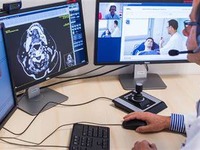A spokesman for the Ministry of Economic Development declined to comment. “We will comment on everything when the EPR is finalized according to the comments of the Ministry of Health. Now only the Ministry of Health is competent to comment,” he explained. The Ministry of Health did not respond to a request from Vedomosti. “At a meeting in the Ministry of Economics, all four EPRs under consideration were discussed - these are the projects [of startups] Data Matrix, M-line, Medsi and Renclinic,” Zingerman specified. In particular, as part of the EPR, Data Matrix planned to collect depersonalized data from electronic medical records of patients for their processing, analysis and conduct of real-world studies (RWE) using artificial intelligence technologies. The technology allows processing medical data of various profiles, including oncological data, and transmitting them over a secure channel. To depersonalize them, the company provides medical institutions with special software, a representative of the developer told Vedomosti. The patient's full name, address, SNILS and other data are permanently deleted with its help, the interlocutor assures. In the application for the creation of an EPR, the startup asked regulators to allow the collection of depersonalized health data without the written consent of the subject of personal data (now it is mandatory). This would allow us to analyze the data of deceased patients, the representative of Data Matrix clarifies. “With the traditional way of collecting data, the deceased would not give consent. This is a plus for expanding the dataset for research and also one of the reasons why EPR can help,” he added. Why EPR is needed in telemedicine According to Zingerman, a number of the Ministry of Health's demands were "unreasonable." For example, the question arose for "Data Matrix" about who will ensure the quality of the data that the company receives from medical organizations, he said. “The question of the Ministry of Health does not make sense, because it refers to the commercial activities of a company that is going to prepare datasets. This will be prescribed within the contract with medical organizations. At the same time, all EPR issues on reducing the risk of disclosure of personal and medical data have been resolved,” the expert explained. The quality of decision-making in medicine depends on the quality of the data and their analysis, says Aleksey Remez, founder of Unim, a medical tech startup. Both of these parameters can be improved if technologies are applied, so the EPR initiative is correct and useful, he believes. “Data quality is always better than 100%, and there are always a lot of problems in terms of data standardization. But it makes sense to consider this nuance already within the framework of specific cases, and not in general,” notes Remez. Ensuring regulated access for developers to anonymized medical datasets is an important step towards the development and implementation of AI innovations, Anna Meshcheryakova, CEO of Third Opinion, a developer of AI technologies for healthcare, agrees. It is important to provide access specifically for specialized Russian companies, ensuring monitoring of the results of work with the data provided, she says. “It makes sense to provide for different levels of access to archives, depending on the core revenue, accreditation, availability of registration certificates and other criteria confirming the seriousness of the company’s intentions,” Meshcheryakova argues. The essence of the experiment proposed by M-line was that the doctor who received the patient and diagnosed him would be able to transfer him to another medical organization for remote monitoring. According to the Ministry of Health, “everything should take place within one medical organization, that is, in fact, the department did not leave a reason for EPR,” Zingerman explained. EPR "Medsi" and "Rencliniki" assumed that in certain situations it would be possible to make a preliminary diagnosis and prescribe symptomatic treatment within the framework of a telemedicine consultation. “But the Ministry of Health said that it would not allow making diagnoses within the framework of telemedicine,” the expert said. A spokesman for M-Line declined to comment. Vedomosti also sent inquiries to Medsi and Renclinika. It was assumed that the effect of the introduced EPR would last three years. After evaluating its effectiveness, the relevant departments should have considered the possibility of making changes to the general and regulatory framework, explained in the ANO Tsifrovaya ekonomika. Zingerman added that some members of the expert group at ANO Tsifrovaya ekonomika, which prepares opinions on EPR in the healthcare sector, do not see the point in further activities. “We spend quite a lot of time studying and evaluating these EPRs, but there is no progress,” he said. Link: https://www.vedomosti.ru/technology/articles/2022/07/20/932329-telemeditsina-podderzhki |
||





























